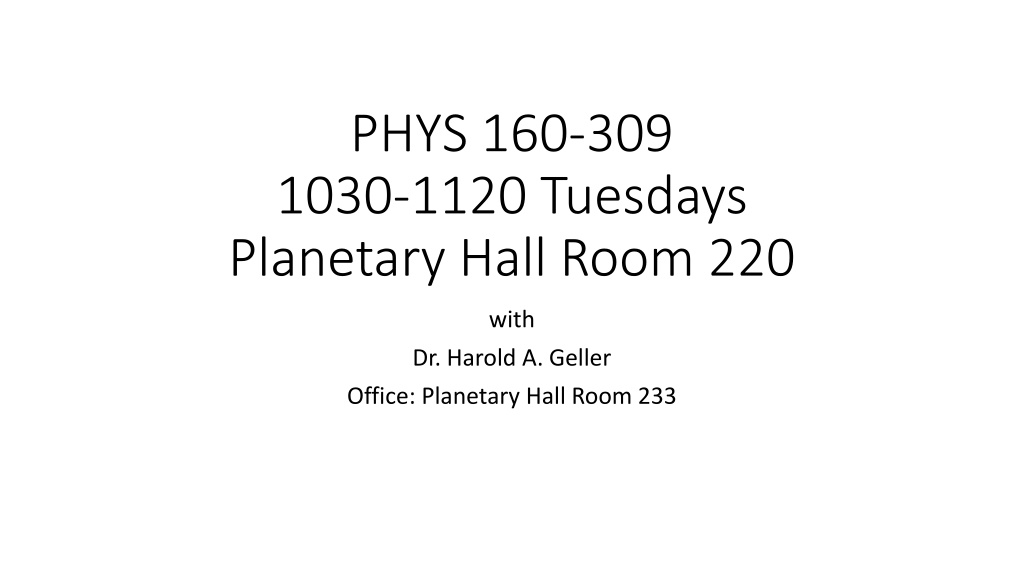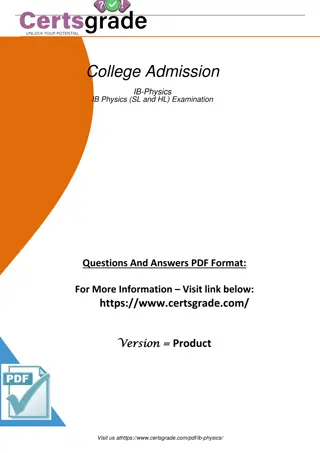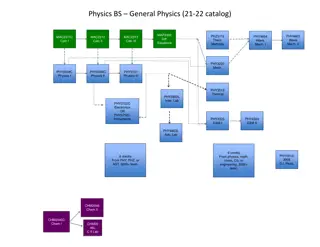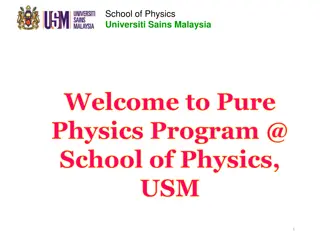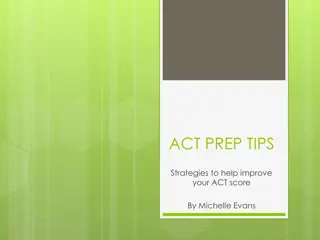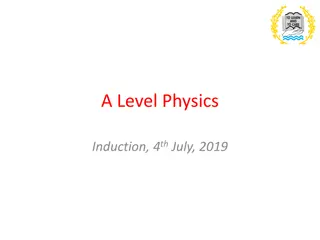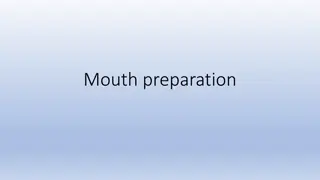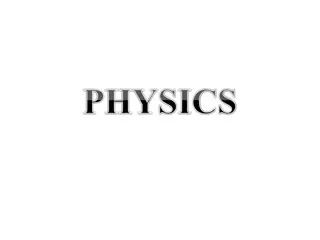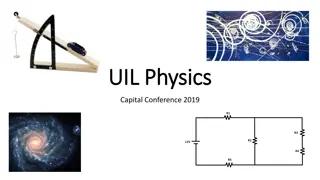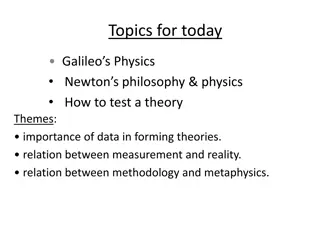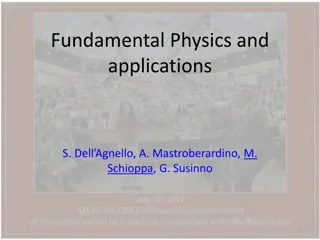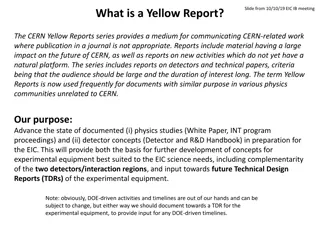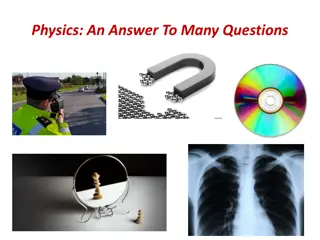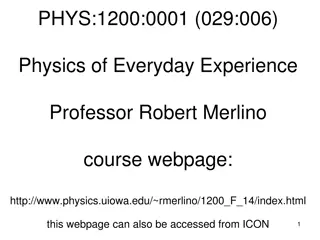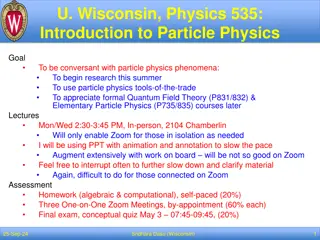Tips for Effective Physics Study and Preparation
Enhance your physics study skills with practical tips for homework, exams, numerical problems, graphical questions, and supporting diagrams. Learn to be confident, manage time effectively, use reasoning skills, follow the honor code, and excel in your physics education.
Uploaded on Sep 30, 2024 | 0 Views
Download Presentation

Please find below an Image/Link to download the presentation.
The content on the website is provided AS IS for your information and personal use only. It may not be sold, licensed, or shared on other websites without obtaining consent from the author.If you encounter any issues during the download, it is possible that the publisher has removed the file from their server.
You are allowed to download the files provided on this website for personal or commercial use, subject to the condition that they are used lawfully. All files are the property of their respective owners.
The content on the website is provided AS IS for your information and personal use only. It may not be sold, licensed, or shared on other websites without obtaining consent from the author.
E N D
Presentation Transcript
PHYS 160-309 1030-1120 Tuesdays Planetary Hall Room 220 with Dr. Harold A. Geller Office: Planetary Hall Room 233
Purpose of Recitations (change over 50 years) Original purpose Aid students in doing homework assignments Preparation for exams Aid in studying physics Aid in understanding physics concepts Morphed or accidental purpose Give students more work for course Give a separate grade for more work Further careers of some individuals in physics education research Add to cost of taking course to the benefit of publishers
Quick Tips for Homework and Exams Be confident and prepared Read test instructions carefully Read each question carefully and read each choice before you record your answer Budget your examination/homework time Use your reasoning skills Use reference tables/equations as allowed (and needed) Don t be afraid to guess Follow the GMU honor code
Quick Tips for Solving Numerical Problems List the appropriate equations Substitute values and units (dimensional analysis) into the equations Display the answer clearly using the appropriate units and to the correct number of significant figures Remember that if the answer is a vector quantity, you need to include the direction
Quick Tips for Graphical Questions Graphs should have titles Plot independent variable on the x-axis Label both axes with appropriate variables and units Divide the axes so the data ranges fill the graph as nearly as possible Plot all data points accurately Draw best fist line carefully with a straightedge Best fits should pass through origin only if data warrant it If calculating slope from graph, use best fit line not individual points
Quick Tips for Supporting Diagrams Draw diagrams neatly and label them clearly Draw vectors to scale and in the correct direction Check to see if you are provided a scale to use for your vectors Use straightedge and protractor to display vectors accurately
Quick Tips for Extended Response Questions Use complete, clear sentences that are logical Use correct physics in your explanations Print clearly and of reasonable size Do not use sentence fragments or incomplete sentences
iClicker Question What is your class level? A Freshman B Sophomore C Junior D Senior E Non-matriculated
iClicker Question Within what college do you find your major subject? A CoS B VSE C CHSS D CEHD E Other
iClicker Question Are you planning on taking the MCAT exam? A Yes B No
Different Ways Ive Run Recitations Which way do you prefer? A Have students present solved homework problems to the class B Have students ask another student to show how they solved question C Use iClickers to ask questions in class D Use iClickers to quiz students on lecture material E Give written quizzes on lecture material
iClicker Question The unit of mass in the SI metric system is the A gram B kilogram C newton D meter
iClicker Question The unit of mass in the SI metric system is the A gram B kilogram C newton D meter
iClicker Question A meter stick has millimeter divisions marked on it. The limit of precision of this instrument is A 0.005 m B 0.01 m C 0.0005 m D 0.001 m
iClicker Question A meter stick has millimeter divisions marked on it. The limit of precision of this instrument is A 0.005 m B 0.01 m C 0.0005 m D 0.001 m
iClicker Question What is the order of magnitude for the measurement 72 meters per second? A 10-2 B 101 C 102 D 104
iClicker Question What is the order of magnitude for the measurement 72 meters per second? A 10-2 B 101 C 102 D 104
iClicker Question How many significant digits are contained in the measurement 500,000 kilometers? A 1 B 2 C 3 D 6
iClicker Question How many significant digits are contained in the measurement 500,000 kilometers? A 1 B 2 C 3 D 6
iClicker Question How many significant digits are contained in the measurement 406.200 seconds? A 6 B 5 C 3 D 4
iClicker Question How many significant digits are contained in the measurement 406.200 seconds? A 6 B 5 C 3 D 4
iClicker Question How many significant digits are contained in the measurement 0.000300 volts? A 1 B 2 C 3 D 6
iClicker Question How many significant digits are contained in the measurement 0.000300 volts? A 1 B 2 C 3 D 6
iClicker Question When the measurements 33.972 kilograms and 0.21 kilograms are added, the answer, to the correct number of significant digits, is A 34 kg B 34.2 kg C 34.18 kg D 34.182 kg
iClicker Question When the measurements 33.972 kilograms and 0.21 kilograms are added, the answer, to the correct number of significant digits, is A 34 kg B 34.2 kg C 34.18 kg D 34.182 kg
iClicker Question When the measurements 8.14 meters and 2.1 meters are multiplied, the answer, to the correct number of significant digits, is A 17 m2 B 17.0 m2 C 17.09 m2 D 17.094 m2
iClicker Question When the measurements 8.14 meters and 2.1 meters are multiplied, the answer, to the correct number of significant digits, is A 17 m2 B 17.0 m2 C 17.09 m2 D 17.094 m2
iClicker Question How can the measurement 0.00567 liters be expressed to one significant digit? A 0.005 L B 0.0050 L C 0.006 L D 0.0060 L
iClicker Question How can the measurement 0.00567 liters be expressed to one significant digit? A 0.005 L B 0.0050 L C 0.006 L D 0.0060 L
iClicker Question The approximate height of a physics student is A 101m B 102m C 100m D 10-2m
iClicker Question The approximate height of a physics student is A 101m B 102m C 100m D 10-2m
iClicker Question The mass of a paper clip is approximately A 1 x 106kg B 1 x 103kg C 1 x 10-3kg D 1 x 10-6kg
iClicker Question The mass of a paper clip is approximately A 1 x 106kg B 1 x 103kg C 1 x 10-3kg D 1 x 10-6kg
iClicker Question What is the approximate length of a baseball bat? A 10-1m B 100m C 101m D 102m
iClicker Question What is the approximate length of a baseball bat? A 10-1m B 100m C 101m D 102m
iClicker Question What is the approximate length of a dollar bill? A 1.5 x 10-2m B 1.5 x 10-1m C 1.5 x 101m D 1.5 x 102m
iClicker Question What is the approximate length of a dollar bill? A 1.5 x 10-2m B 1.5 x 10-1m C 1.5 x 101m D 1.5 x 102m
iClicker Question What is the approximate mass of an automobile? A 101kg B 102kg C 103kg D 106kg
iClicker Question What is the approximate mass of an automobile? A 101kg B 102kg C 103kg D 106kg
iClicker Question What is the approximate mass of physics student? A 10 kg B 50 kg C 300 kg D 500 kg
iClicker Question What is the approximate mass of physics student? A 10 kg B 50 kg C 300 kg D 500 kg
iClicker Question The approximate thickness of a piece of paper is A 101m B 100m C 10-2m D 10-4m
iClicker Question The approximate thickness of a piece of paper is A 101m B 100m C 10-2m D 10-4m
iClicker Question The mass of a pencil is approximately A 5 x 10-3kg B 5 x 10-1kg C 5 x 100kg D 5 x 101kg
iClicker Question The mass of a pencil is approximately A 5 x 10-3kg B 5 x 10-1kg C 5 x 100kg D 5 x 101kg
